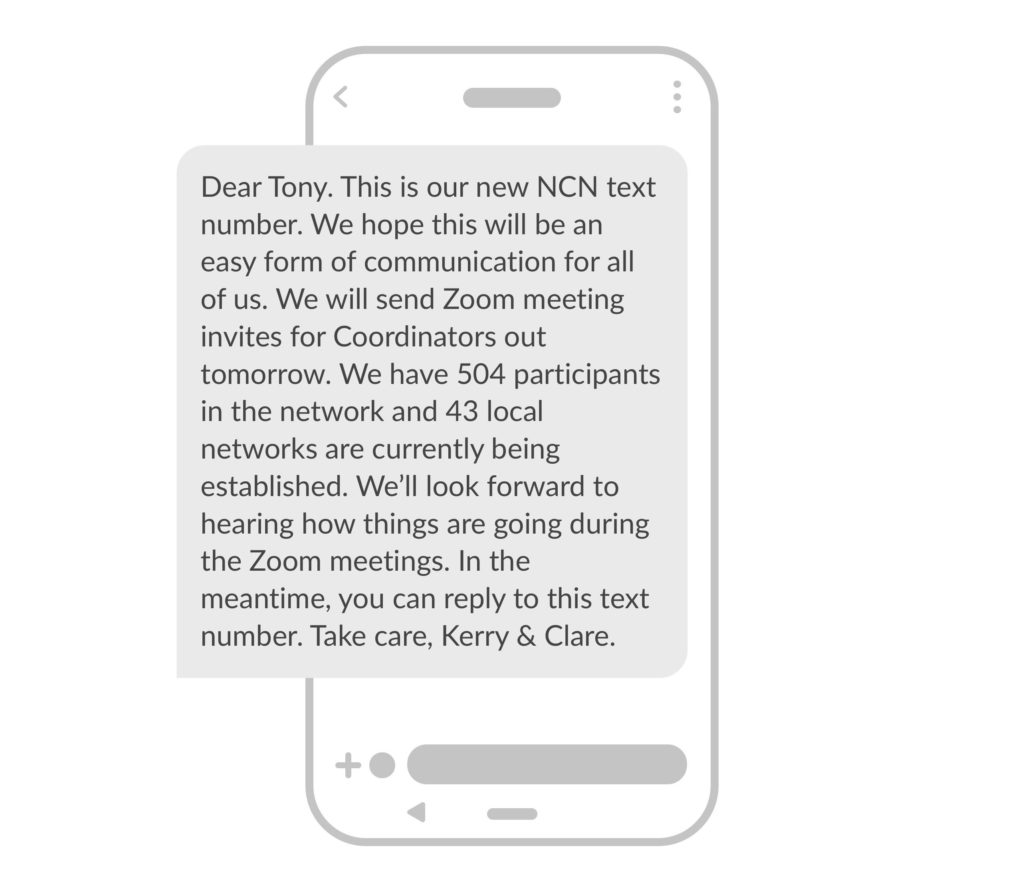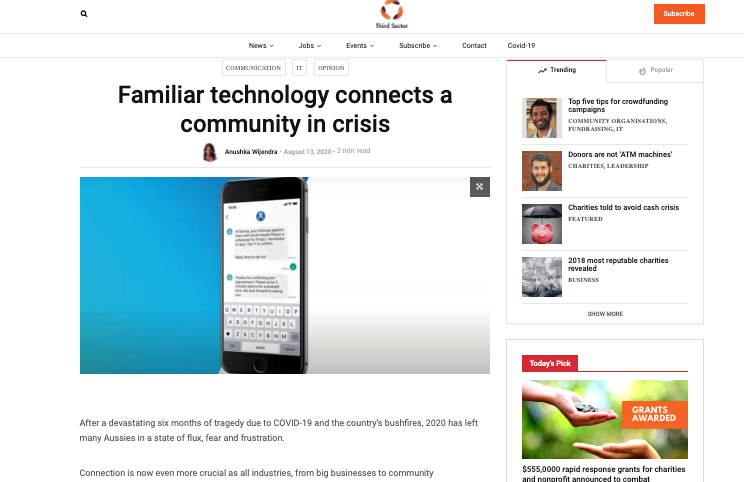Connecting a neighbourhood network in a crisis

In April 2020, the Bellingen Shire Council in regional NSW, Australia rushed to set up a Pandemic Response Group to protect its community against the potential but devastating effects of COVID-19 on the region. The Black Summer bushfires severely hit the areas around the Bellingen Shire in late 2019. During that disaster, there was a considerable lack of emergency support and resources as many had been redirected to larger population centers close by. According to NCN Coordinator, Kerry Pearse, the community realised they would need to take steps themselves to look after one another.
Setting up this network was a way of linking people up and helping us all understand where the older and vulnerable people were, and to get ready for what we might need to do.
After a Pandemic Response Group was created, the community gathered to explore different initiatives, including the possibility of their own NCN. The NCN, short for Neighbourhood Care Network, is an ‘array of local neighbourhood groups so that people locally can support each other‘. Taking inspiration from UK’s COVID-19 Mutual Aid, Bellingen’s NCN aimed to build a similar community network across the Shire so that those in need could seek out, connect, support, or seek help from others during a crisis.
Watch our video interview here:
The challenge
Once the Pandemic Response Group approved the NCN, things moved quickly. A call went out for people to register as volunteers, coordinators or people who thought they might need help, and the team got to work putting together a front-end system in just a few days. However, one logistical problem remained.
Problem: How were they going to communicate with registered volunteers and coordinators?
Communication was “really, really hard”, according to Kerry. Hundreds of people had already registered, but the team had no straightforward way of communicating with them. The software they were using to build their database had no communication functionality, nor could any communication channel be easily integrated into the software. The team immediately began trialling widely used communication methods such as email.
Unfortunately, setting up an email list was “really hard and took a long time.” Not only was it ‘fiddly’, and ‘clunky’, it was ineffective. When Kerry spent most of one Saturday setting up a list to send out manually, “most of the emails didn’t get through.”
Email did not perform, garnering an average response rate at a middling 8.4%. This fared worse when an active call-out to encourage coordinators to catch up on a Zoom virtual conference drove only 12 out of 92 recipients (13%) to show up. Email is generally the first choice for many non-profit organizations, but in times of urgency, it may not always be the best option.
The other thing was, people, don’t read their email. They read texts.
In addition, the team called in volunteers to try to reach everybody manually through one-on-one phone calls. However, with over 90 coordinators to call, this again proved exhausting and time-consuming.
The NCN needed a regular communication channel to reach everyone easily and quickly. One that also involved little cost nor set up and would be familiar and easy to use. Effective communication was of utmost importance, especially in ensuring the success of the network.
The solution
Another team member who had been volunteering to organize the NCN with Kerry suggested using SMS. She had previously engaged in some international aid crisis work that had used text messaging services to great success. Kerry had also worked at a business that used SMS to communicate with customers through a cloud-based subscription service.
It was really miraculous by the time you came along that our communication needs were really tough. And having the support from you guys has made us able to communicate with the people who had registered and the coordinators in a way we just couldn’t before.
How we did it
Having seen the devastating effect COVID-19 had on hospitality venues and non-profits alike, MessageMedia extended our current ‘text-in’ SMS offer to charitable organizations in need. The package included free use of our SMS services during the shutdown, set-up assistance and continual access to our expertise, tools and guides, including our COVID-19 resource hub.
After finding our offer online and chatting with one of our very helpful customer agents, Kerry was set up with a free account and non-profit COVID-19 package within one day. She was able to trial the service after the Easter break, sending an SMS broadcast to the 504 volunteers who had registered.

The response rate to this first SMS broadcast was an astounding 30%. Given those results, the NCN was pleased to move forward with using SMS for relevant and timely communications. The team can now easily send communications to all registered volunteers at the minimum without any of the difficulty that came with their previous communication attempts.
This meant we could reach out to them, and we couldn’t before.
The results

After using it now for over two months, Kerry has seen an incredible uptake in communication and engagement with her community of volunteers, and coordinators.
With SMS, Kerry saw the NCN’s response rate jump from 17.6% to 26% for a passive call out within the first hour. This call-out was simply to ask her coordinators if anyone wanted to put their hand up to help shape the future of the network.
Also, the response rate for an active call-out jumped to almost 50% via SMS when Kerry put a call out to fill the Cupboard of Plenty, a bookcase situated outdoors where residents could drop off food and dry goods for the homeless. The results of this SMS call-out were astounding:

Why it worked
We’re getting a really high response rate to our text. You know, I spent two hours going through the SMS inbox yesterday morning responding to texts we’d sent them, so it’s quite an interactive communication which is great. And it’s much more reliable because we know it’s getting there, they don’t bounce or get sent into a junk folder. And people read their texts much more quickly.
There were four critical reasons SMS supported the NCN’s exact needs:
- Ease
Depending on your provider, SMS should be easy to set up and use. Most are familiar with the technology and depending on your provider, it’s essential that the product you use is intuitive and can serve users of all kinds, with different digital levels and skills.
The team at MessageMedia are trained communication specialists, not sales agents. We aim to deliver exceptional service by treating customers like humans with real problems. Kerry’s point of contact immediately recognized that the NCN team not only qualified for the non-profit SMS package but needed additional human support and care to get set up fast.
- Rapid response
As the bushfires demonstrated, a communication tool that produces rapid responses was a necessity. According to a Polymail study, the average response time for an email is about 16.83 hours. Compare that to the average response time for an SMS: 90 seconds.
As the results demonstrated, SMS easily outdid email in rallying volunteers and coordinators to action. There will always be a time and place for email, but in times of crisis or quick actions, SMS is the way to go.
- Budget
SMS can prove great for smaller start-ups, organizations and businesses as a communication tool. The NCN was able to take up our free SMS package for non-profits, but text messages as a whole are an economical option for any budget.
- Versatility
Similar to ease, the NCN was seeking a solution to meet specific crisis needs. Given the continually changing conditions of COVID, the chosen communication solution needed to perform, be easily adaptable, and encourage rapid responses and actions.
SMS did all of this, and as Kerry pointed out, also allowed the team to be able to interact and converse with volunteers in a personal, direct way that isn’t easily replicated by other channels.
Future use
According to Kerry, things have quietened down, and they are in talks about the future of the network. It is likely it will continue at a more local level, as it has proved truly beneficial to the community as a loose network to encourage neighbours to look out for one another.
The team can stand back up if needed to tackle future crises. Having access to an SMS channel should there be a second COVID wave or other crises is enormously helpful to Bellingen Shire’s community in the long term.
If we did have to get the word out in an emergency, this is such a good way to do it.
Should the NCN need to get started up again, they could use SMS further to support the growth of the network by:
- Extending use to coordinators via Email to SMS
Currently, the use of SMS for the NCN remains at the top level. Like with many of our education clients, this can be extended down. Principals and school administrators often give teachers the ability to personalize SMS communications with their classes.
This can be done directly from email without having to give teachers or in this case Bellingen’s coordinators, access to the team’s SMS portal.
- Extending the use of SMS to NCN’s delivery fleet
To further support the local community, a delivery fleet was launched by the NCN to help those who are vulnerable, elderly or in need, get groceries or other items delivered to them while in isolation. SMS automation could be set up, like with Australia Post, to notify recipients ahead of time when they should expect delivery.
- Extending the use of SMS to the Haveachat initiative
The NCN also launched an initiative where lonely or isolated members of the community could reach out via the phone to talk to others. Similar to Crisis Text Lines, the NCN could extend their SMS service between volunteers and those in need.
Media coverage

Work for a non-profit? Find out how SMS can benefit your business. Contact us now.
